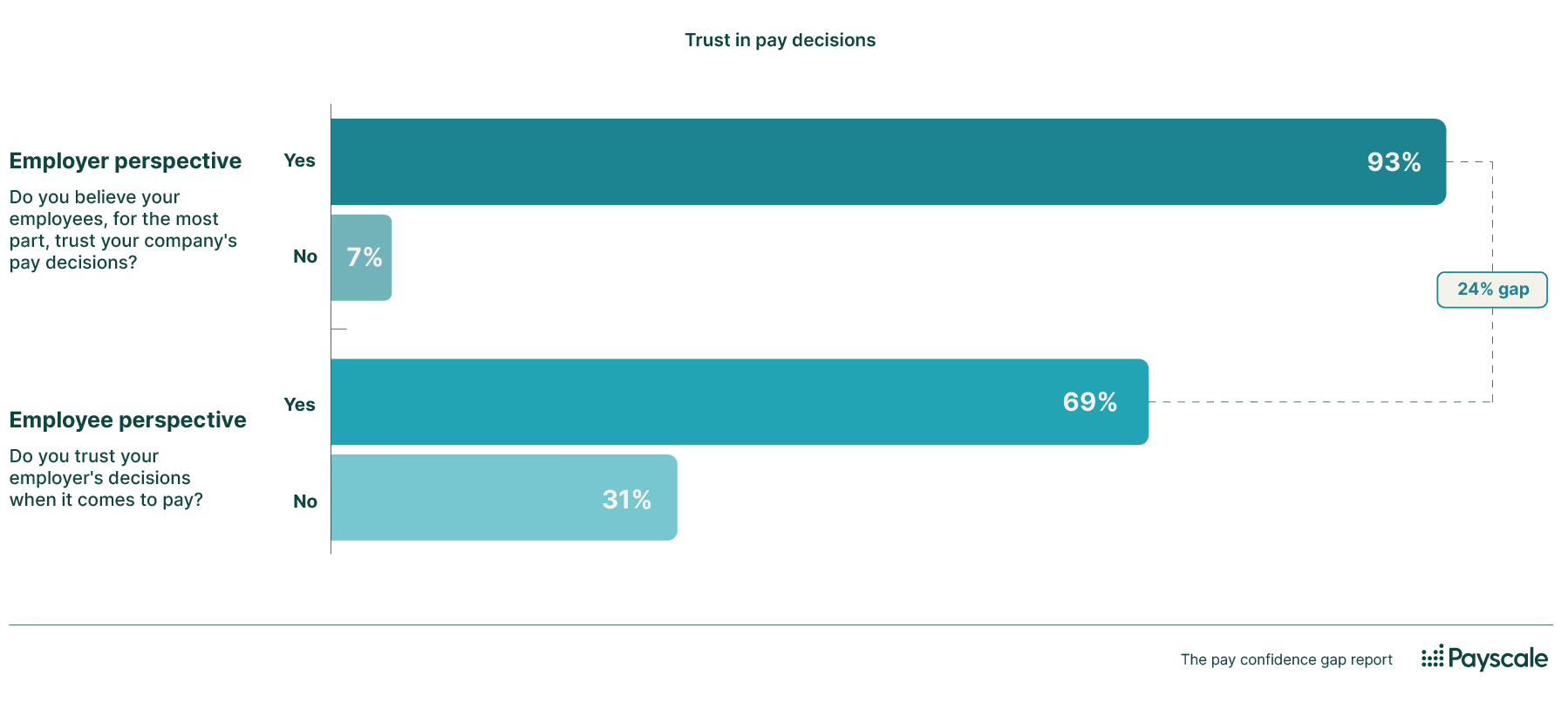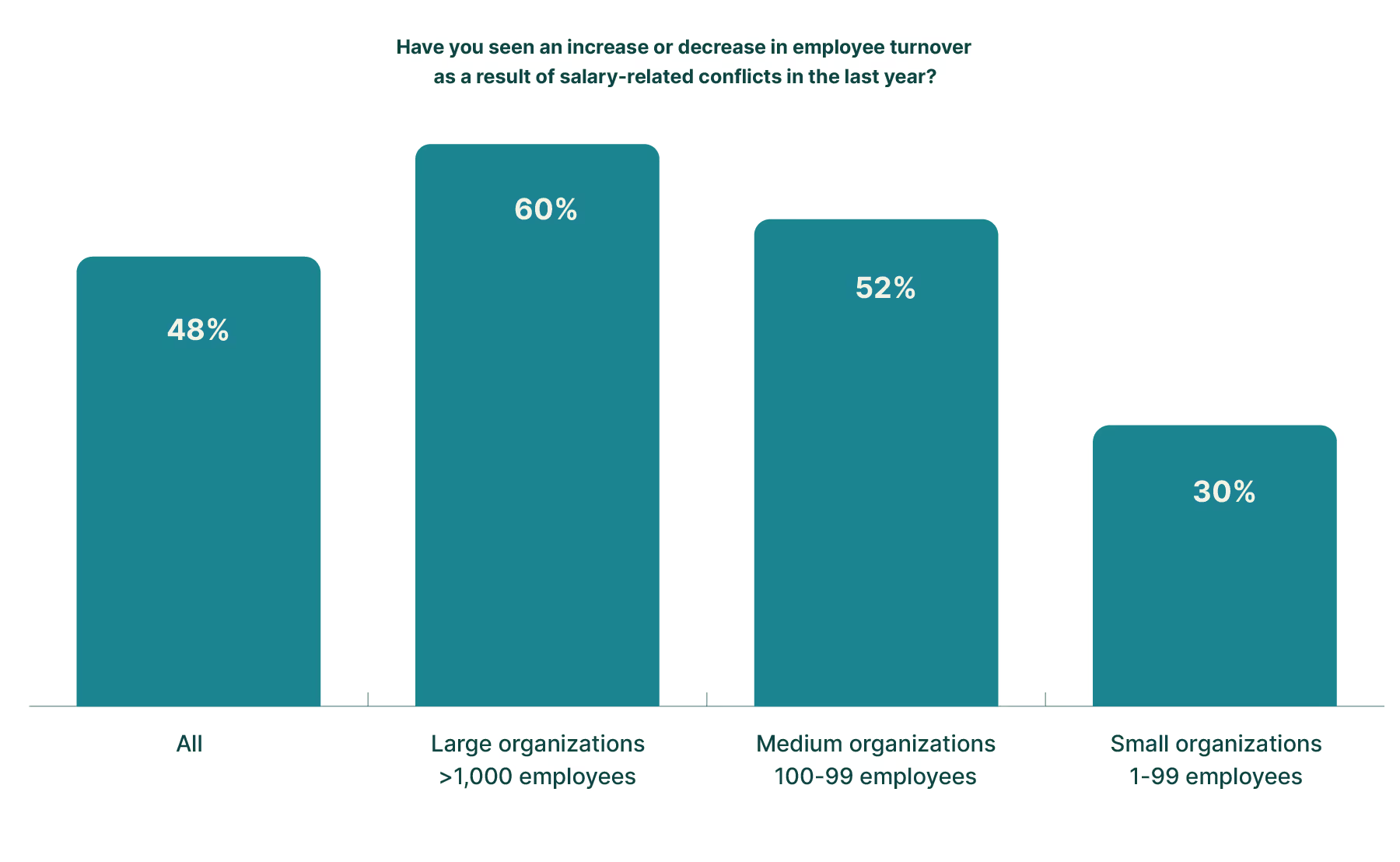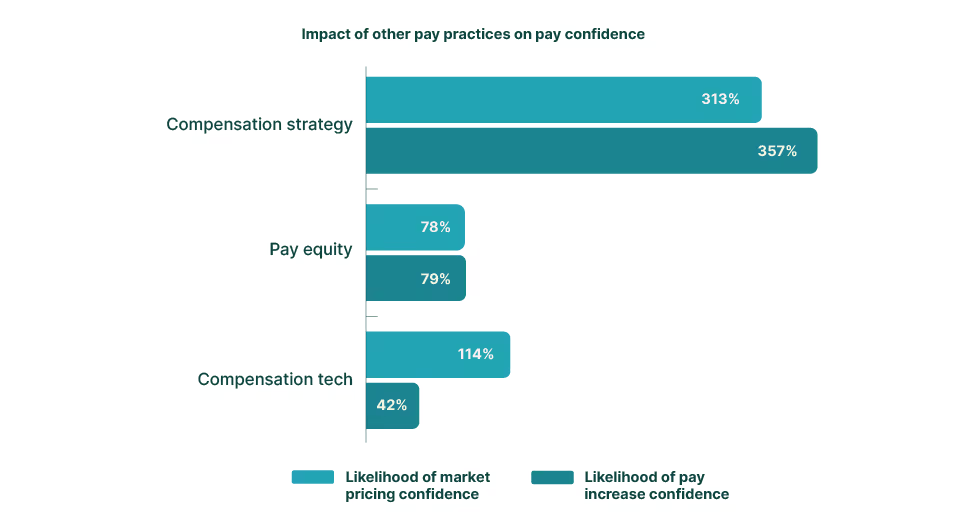The trust gap surrounding pay has grown. Unfortunately, employers haven’t received the message.
Our recent Pay Confidence Gap Report reveals an alarming disconnect between employers and their workforce. While 93 percent of employers believe employees trust their pay decisions, only 61 percent of workers report that they do.

This mismatch suggests that organizations might be missing the mark in fundamental ways: whether it’s not fully grasping employees’ concerns about pay decisions, falling short when it comes to pay transparency, or not having effective pay conversations.
The pay confidence gap can have significant repercussions. Employers who can’t confidently explain pay decisions risk increased voluntary turnover, which can lead to costly hiring expenses.
The price of a bad pay conversation
SHRM estimates the cost to replace an employee at 3x to 4x their salary. With such a high cost attached to voluntary turnover, HR practitioners would be wise to devote resources to equip people managers to have productive pay conversations.
Why?
According to our research, 66 percent of workers would consider leaving their jobs if a pay conversation went poorly.
Millennials (72 percent) and Gen Z (71 percent) are leading this charge, while Boomers are notably less likely to claim jumping ship over poor pay convo at 47 percent.
And here’s the thing. Employees are not just talking about leaving their jobs — they’re doing it.
Nearly half of employers (48 percent) have watched turnover numbers climb specifically because of salary-related conflicts over the past year. Sixty percent of large companies are seeing this play out, with 52 percent of mid-sized organizations and 30 percent of smaller businesses dealing with the same thing.

Let’s dive deeper into the cause of these pay conflicts.
The rise of pay misinformation
During salary negotiation, employers and employees often find themselves on different pages because they’re working from completely different playbooks.
While employers use HR-reported data, employees are gathering data online or simply asking around, which can lead to salary misinformation.
According to our research, 72 percent of employers have noticed more employees coming into salary conversations armed with information they’ve found online.
The challenge? When employees base their requests on unreliable data, salary demands can inflate pretty quickly. The average (mean) that employers estimate for salary requests made by employees citing unreliable sources of information is 31 percent.
Generative AI is only adding to the problem. Employers report a 70 percent increase in employees using AI tools such as ChatGPT for salary data. The net result? Thirty-eight percent of employers say employee expectations around salary are higher than ever before, with another 30 percent reporting that employees are receiving conflicting information.
On the other hand, a sizable number of employees feel that AI is strengthening their bargaining power. Thirty percent report querying AI left them feeling more confident going into salary negotiations.
This is where purpose-built compensation software becomes a game-changer. By offering employers access to reliable just-in-time market data, these platforms eliminate the guesswork and misinformation that fuels salary conflicts.
The impact is significant. Organizations using purpose-built comp software see their pay confidence increase 2x, creating the foundation for better pay conversations and a more productive workforce.
How cost of living impacts pay conversations
Cost of living has been a top concern for both employers and employees since the pandemic, with spikes in both inflation and wage growth. Two-thirds of employers have seen more employees pushing back on their pay based on local cost of living in the past year.
At the same time, 88 percent of employees believe pay increases should reflect changes in the cost of living, but only 66 percent think it does.
The stat that should concern HR practitioners? Almost half (49 percent) of employees we surveyed indicated that they thought about leaving their jobs in the past year because they feel their pay hasn’t kept up with inflation. In addition, 76 percent said they would consider leaving their job if their performance isn’t adequately reflected in their compensation package.

With employees often confusing merit increases with COLA adjustments, it’s up to HR to navigate these challenging conversations and retain top talent.
The state of the economy hasn’t made things easier. Uncertainty about tariffs and a possible recession has caused employers to pull back on hiring and become more cautious about pay increases.
Nearly a fifth (19 percent) have delayed hiring plans due to economic uncertainty, while 33 percent are taking a hard look at their pay structures. Another 32 percent are reconsidering the size of pay increases.
It’s no surprise that the majority (53 percent) of employers expect pay conversations to be more challenging over the next year.
Organizations need pay confidence
Having a compensation strategy transforms organizations' confidence in their pay decisions. Our research found that employers with a clear compensation strategy are 4.6x more likely to feel confident about their pay increases and 4x more confident in their market pricing. It makes a massive difference.
At the same time, organizations who conduct a pay equity analysis are 80 percent more likely to rate their confidence, while those using purpose-built compensation technology are over twice as likely to feel confident about their market pricing and 42 percent more confident in pay increases.

When tough pay conversations arise (and they will), the organizations that handle them best have three things in common: a thoughtful compensation strategy, the right tech tools, and a commitment to pay equity. This combination creates the confidence that makes difficult pay discussions productive instead of painful.

.avif)


.png)

